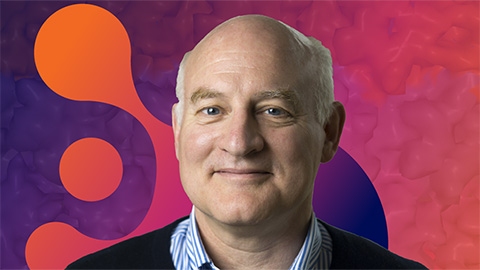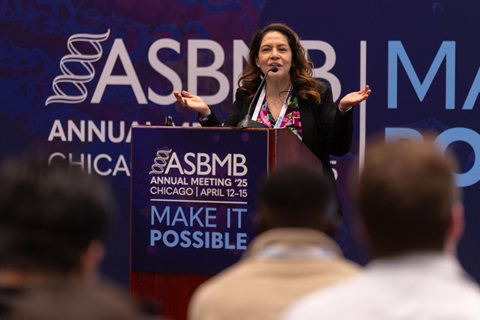Making science more accessible: science communication careers
This week, I will focus on science communication careers. A few years ago, I started my science communication career as a way to combine STEM education, communication and support for the next generation of scientists. This is the beauty of science communication: having a career that is flexible and exciting. A great science communicator does three things: makes science more engaging to the public, finds ways to support outreach, and curates content using a variety of formats to target audiences.
How to prepare for a science communication career
Build your professional brand.

Science communication is all about being social: online and offline. Social media is your friend (mainly Twitter) and can help you find your niche. Follow @ASBMB and #scicomm to join the conversation. Get involved in science outreach and science communication activities at the ASBMB Annual Meeting. The #ASBMB2020 theme is Community Binds Us, which is the core of science communication. Think of your social media account as an extension of your professional brand — your digital footprint.
Create a portfolio.
Create a website for your portfolio and/or start a blog to showcase your work. Your portfolio should include a résumé that highlights your education and science communication experience, links to your social media handles and an updated list of your science communication work.
Read. Write. Repeat.
Science communicators are digital storytellers/narrators who strive to make science accessible to all. Read the Chicago Guide to Communicating Science: Science Edition by Scott L. Montgomery and keep it as a resource. If you are interested in gaining more writing experience contact, Comfort Dorn, ASBMB Today's managing editor, at cdorn@asbmb.org.
Develop your science communication skills.
Take the ASBMB's Art of Science Communication course and/or the Writing in the Sciences course on Coursera.org. Both courses are great foundation courses and will strengthen your science communications skills. If you are a predoctoral or postdoctoral fellow in the biological sciences, apply for the iBiology Young Scientists Competition. This is an all-expenses paid multiday science communication workshop held at the University of California, San Francisco, where early-career scientists get the opportunity to learn skills to improve their research talks. Deadline: Dec. 16.
Get experience in a fellowship.
- The American Association for the Advancement of Science (Washington, D.C.) has a 10-week summer Mass Media Science & Engineering Fellowship that focuses on radio, television, newspaper and magazine media. Must be an enrolled student (upper-level undergraduate or graduate student), postdoctoral trainee or have earned a STEM degree within the past year. Deadline: Jan 1.
- The National Cancer Institute has the communications fellowship for scientists who have some experience/education in science writing, public health or health communications. This fellowship is open to students currently enrolled in graduate school or recent graduate degree recipients (no more than two years). Deadline: Jan 3.
- If you are looking for an international fellowship opportunity, The International Institute for Applied System Analysis in Vienna, Austria, has a science communications fellowship (summer 2020). This fellowship focuses on communicating science through various forms and translating complex scientific research. Requires a bachelor’s degree in science or journalism. Deadline: Jan 11.
Below are fellowships with the Oak Ridge Associated Universities, and these require a degree received in the past five years.
- The U.S. Department of Defense has a 12-month research science communication and education fellowship at the Walter Reed Army Institute of Research (Silver Spring, Maryland) that focuses on visual communications and multimedia for therapeutics research. Requires a STEM bachelor’s or master’s degree and experience in Adobe Illustrator, InDesign, Photoshop and other related multimedia programs.
- The Centers for Disease Control and Prevention (Atlanta) has a health communication fellowship that focuses on Type 2 diabetes prevention and evaluating multifaceted public health communication and marketing campaigns. Requires a master’s degree in a relevant field. Deadline: Dec. 9.
Science communication job titles vary, so think about what type of role you want. Here are two faculty positions and one staff position at universities.
- The University of Wisconsin–Madison has an opening for a tenure-track assistant professor of science communication in the Department of Life Sciences Communications. This position focuses on data visualization, data journalism and communication campaigns. The position is open until filled with an anticipated start date of Aug. 1. Requires a Ph.D. in communication or related field.
- George Mason University (Fairfax, Virginia) is hiring a tenure-track assistant professor of science communication for environmental decision-making and policy. This position involves teaching, advising and developing an independent research program that focuses on environmental and sustainability policy. Requires a Ph.D. in environmental, sustainability or policy with postdoctoral experience. Deadline: Jan 15.
- Johns Hopkins University (Baltimore) is hiring a communications specialist in the Department of Health Policy and Management at the Bloomberg School of Public Health to support all communication efforts. Requires a bachelor's degree in a related field and interest in public health and policy.
Science production positions focus on producing scientific content using digital communications.
- iBiology is hiring a full-time director of The Explorer's Guide to Biology(XBio) to oversee the production pipeline of all content to reinvent the undergraduate biology "textbook.” This position is based in San Francisco, but the job location is flexible for U.S. remote work. Required: a Ph.D. in the biological sciences and strong writing/biology educator experience. The deadline is Dec. 1 with an anticipated start date of Jan. 2 (flexible).
Science communications and marketing positions focus on promoting information and engaging target audiences.
- The American Society for Microbiology is hiring an advocacy communications coordinator to work in the marketing and communications department to develop effective communications strategies and outreach to members. Requires a bachelor’s degree in science, journalism, communication or public relations.
Enjoy reading ASBMB Today?
Become a member to receive the print edition four times a year and the digital edition monthly.
Learn moreFeatured jobs
from the ASBMB career center
Get the latest from ASBMB Today
Enter your email address, and we’ll send you a weekly email with recent articles, interviews and more.
Latest in Careers
Careers highlights or most popular articles

Mapping proteins, one side chain at a time
Roland Dunbrack Jr. will receive the ASBMB DeLano Award for Computational Biosciences at the ASBMB Annual Meeting, March 7–10, just outside of Washington, D.C.

Exploring the link between lipids and longevity
Meng Wang will present her work on metabolism and aging at the ASBMB Annual Meeting, March 7-10, just outside of Washington, D.C.

Upcoming opportunities
Calling all biochemistry and molecular biology educators! Share your teaching experiences and insights in ASBMB Today’s essay series. Submit your essay or pitch by Jan. 15, 2026.

Defining a ‘crucial gatekeeper’ of lipid metabolism
George Carman receives the Herbert Tabor Research Award at the ASBMB Annual Meeting, March 7–10, just outside of Washington, D.C.

Building the blueprint to block HIV
Wesley Sundquist will present his work on the HIV capsid and revolutionary drug, Lenacapavir, at the ASBMB Annual Meeting, March 7–10, in Maryland.

Upcoming opportunities
Present your research alongside other outstanding scientists. The #ASBMB26 late-breaking abstract deadline is Jan. 15.

